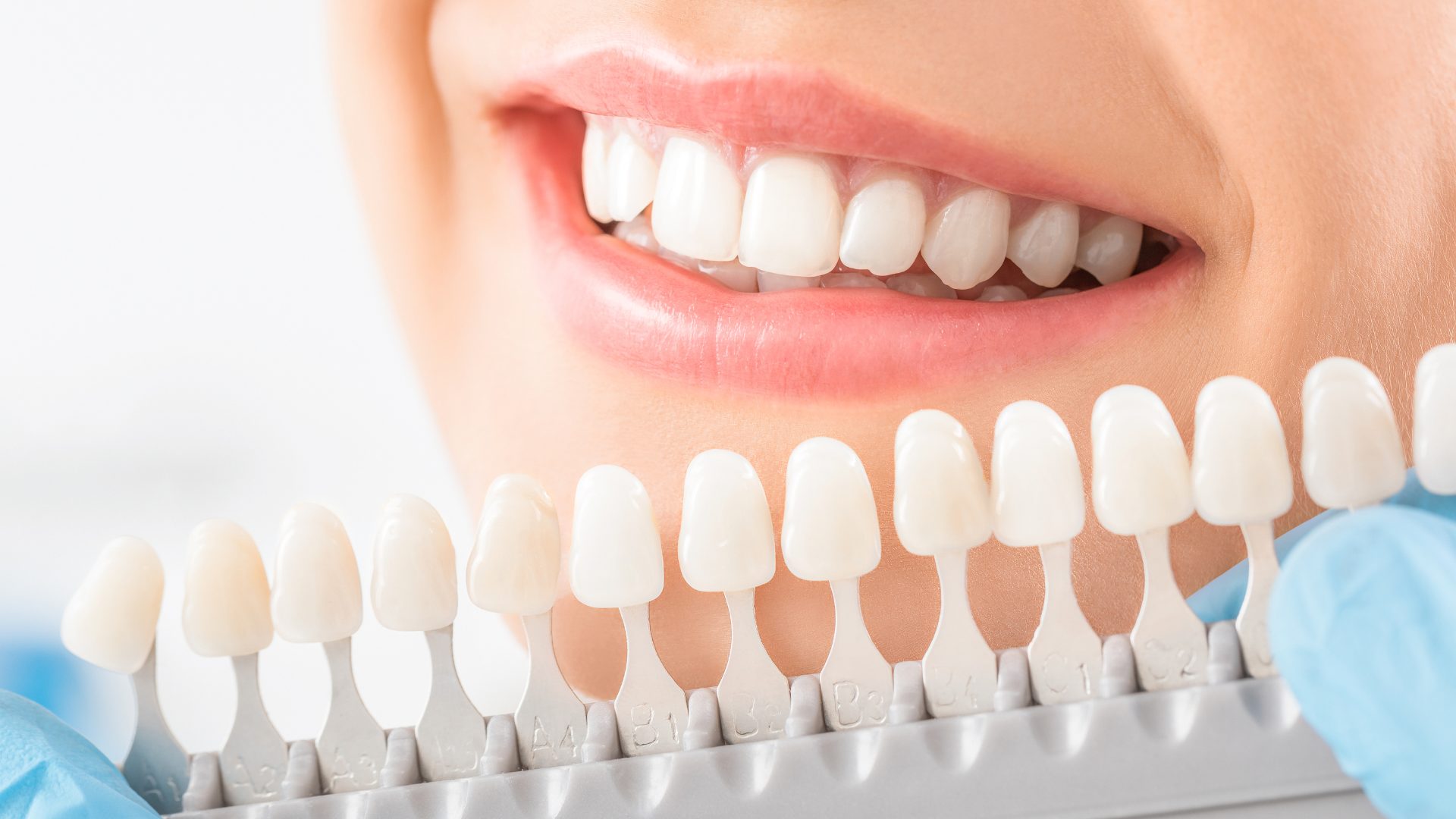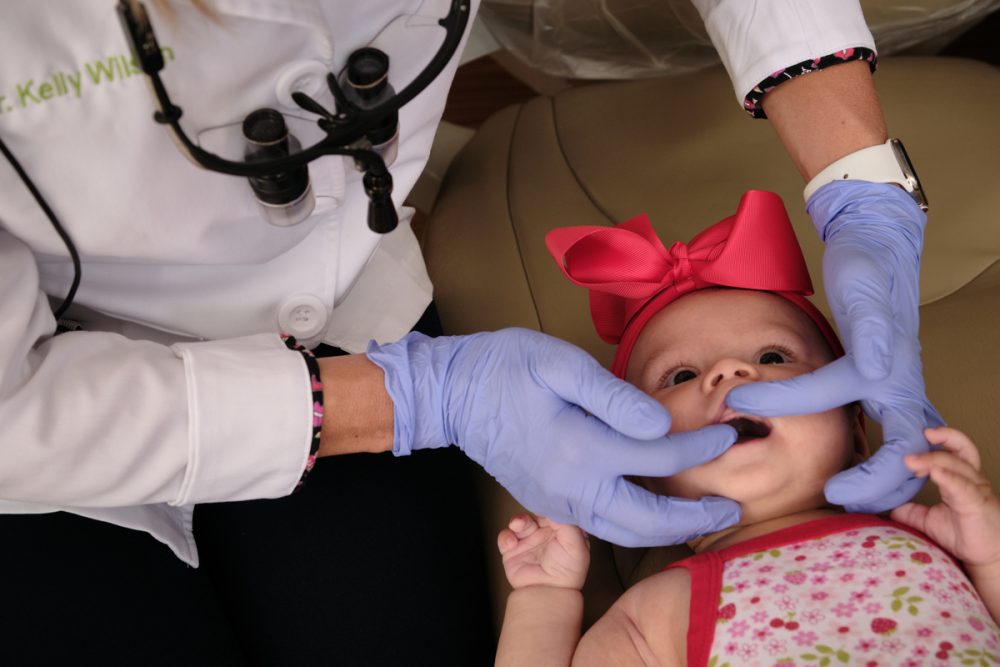
Is Teeth Whitening At The Dentist Safe?
August 16, 2022
How To Keep Your Smile Makeover: Our Guide
October 3, 2022The first year of a child’s life contains many exciting milestones, including the first tooth. If you are a parent of an infant, somewhere around your child’s six months of life, you may end up researching how to take care of the baby’s first teeth.
The first teeth are so crucial to your child’s future dental health. Caring for them from the start sets the groundwork for healthy development. We hope this article helps you get started.
About the First Teeth and Teething
Your baby is born with 20 tiny teeth within the gums. Somewhere between six months and a year, a tooth will erupt from the gums, and more will follow. This process is known as teething and is often uncomfortable for both the child and the parents. Your child may be as old as two before all the baby teeth come in, but those first two years are still important.
Tenderness, fussiness, drooling, slightly swollen gums, and crying are common during teething. However, fever and serious infection are not. If your child develops a fever or shows signs of illness, contact your child’s pediatrician or urgent care, depending on the symptoms.
Oral care starts before your baby even has teeth. Clean your baby’s gums twice daily with a washcloth after feeding and bedtime. This keeps sticky bacteria from building up and damaging the teeth when they emerge. Healthy gums are important throughout our lives.
You may relieve your baby’s discomfort by gently massaging the gums with a clean finger. Solid teething rings or a clean cold washcloth are other options suggested by the American Academy of Pediatricians.
Avoid giving a baby aspirin since it is associated with a rare condition known as Reye’s syndrome. Instead, talk with your pediatrician about an age-appropriate dose of another pain medication.
The Food and Drug Administration warns parents against over-the-counter products containing Belladonna and benzocaine because of a risk of potentially terrible side effects. They also advise against amber teething bead necklaces since they can be a choking or swallowing hazard.
Teething can also be exciting as you will see a little pearly tooth emerge! It’s right up there with a baby’s first steps and baby’s first words.
How to Take Care of Baby’s First Teeth
Be aware that tooth decay can start when your baby’s first tooth emerges. Start cleaning the teeth twice a day from the start. Use a special, soft baby toothbrush. Look for toothpaste and dental products with the American Dental Association seal of approval. You don’t need to use much toothpaste. Aim to apply a rice grain-sized amount of toothpaste on the baby’s brush first, especially before your child reliably spits.
Fluoride is a natural mineral that also strengthens the teeth. Most city tap water contains fluoride, so if you give your baby water to drink, you will most likely introduce fluoride into the diet. If your tap water isn’t safe to drink or you normally drink bottled water, talk with your child’s pediatrician about alternative sources of fluoride.
Once your child can spit, fluoride toothpaste is essential. At that point, use a pea-sized dab of toothpaste to brush your child’s teeth. Also, floss your baby’s teeth daily. Child-friendly flossing sticks may make it easier. Replace your child’s toothbrush every three months or sooner if it shows signs of wear and tear.
Sometimes babies experience bottle decay or nursing caries. These terms refer to tooth decay from drinking milk, fruit juice, or other sweet drinks without adequate oral care. Please only put the following in your baby’s bottle during a typical day:
- Breast milk or baby formula
- Water
- The electrolyte drinks pediatricians often recommend when a baby is ill or at risk for dehydration
While it may be all right to occasionally give your baby pure or diluted juice as a special treat, be aware that fruit juice may cause tooth decay. Sometimes parents give their children honey pacifiers which also increases the risk of tooth decay. Talk with your pediatrician about juice, so you have clear guidelines on the safest way to give your child juice.
Between meals, give your child plain water rather than juice, sodas, or other drinks that contribute to tooth decay. Also, train your child to drink from a regular cup as soon as they are able instead of a sippy cup. With a sippy cup, liquid tends to collect around the teeth more, and if the drink contains sugar, it increases the risk of cavities.
Many babies find relief with teething toys. Just be sure the toys are large enough that your baby can’t swallow them and that all materials are safe and non-toxic. Your pediatrician will be able to give you the latest information.
When to Schedule Baby’s First Dental Appointment
Schedule your baby’s first dentist appointment as soon as you see a tooth emerge but no later than your child’s first birthday. While some children receive their first teeth later, get your child checked out to ensure everything is developing well. That first dental visit is also a great time to ask questions about your child’s oral health and how to take care of those precious baby teeth best.
Up until that first dentist visit, your child’s pediatrician will monitor the oral health and development during well-baby visits. Be sure to ask any questions you may have about oral health, easing your baby’s discomfort, and what to expect.
Your pediatrician may also be able to recommend a dentist who cares for children’s teeth.
At Southview Dentistry, we are proud to serve parents and children in the Charlotte, NC, area. Infant oral health and development are very dear to our hearts. We offer preventative dental care for the whole family since it is never too early to prioritize oral health.
If you live in the area and are ready to establish dental care for your child, contact us today to schedule your baby’s first dental appointment.




